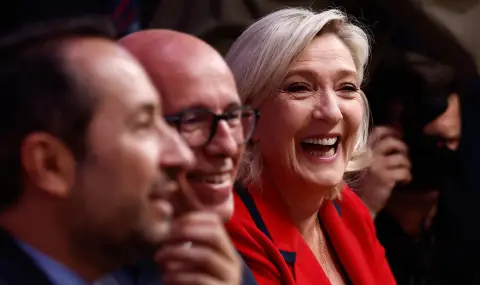The French are electing a new composition of the National Assembly today, after President Emmanuel Macron surprisingly dissolved the parliament three weeks ago, DPA reported, BTA writes .
Macron's shock decision to take such a risky move followed a heavy defeat for his far-right centrist government in European Parliament elections. Macron's job is not in jeopardy in the two-round election, but the makeup of parliament will have a major impact on the remainder of his term, which runs until 2027. Here's how the vote played out in one of Europe's most powerful countries:
What is the role of the National Assembly?
The National Assembly is the central pillar of the French Parliament. Deputies, who are 577 in total, are directly elected for a term of five years and vote on laws. There is also a second chamber of the Parliament - the Senate, which plays a secondary role and is elected at other times. If the two houses cannot agree on a law, the government has the power to give the final say to the National Assembly. Before the dissolution of the National Assembly, Macron's centrist alliance had the most seats, but not an absolute majority.
How important is it for Macron that his party gets a majority?
The disputes and struggles in the French parliament over the past two years have shown that governing without an absolute majority in the National Assembly is difficult. But the majority will be particularly important to Macron for one main reason – the lower house can topple the government with a vote of no confidence.
If an absolute majority is obtained by one of the opposition camps, which according to sociological surveys is possible, the president will be forced to appoint a prime minister of the government from the ranks of the relevant political force. Far-right nationalists have hopes of entering government. Even if, in such a scenario, Macron's position is not threatened, the position of the current French leader will significantly weaken.
How is the election process going?
Deputies are elected directly by citizens in electoral districts. Candidates who receive the support of more than half of the voters in a given constituency win a seat in parliament. However, for this purpose there is one more condition - the share of ballots for the winning candidate must be equal to at least a quarter of the registered voters in the respective district. Very few candidates will be able to meet these conditions in the first round of voting.
Most places will be allocated in a second round which will take place in a week. The two candidates in first and second place in the given electoral district must go to the runoff, but also any other contender who received the support of at least 12.5% of all registered voters in the district. If several candidates make it to the second round, it often happens that some of the contenders drop out of the race. This tactic is used to consolidate voters and prevent far-right candidates from winning.
When will the results be known?
As members of parliament are elected by district (majority) and not by proportional representation, no results will be announced on who received what support at the national level. However, election analysts will aggregate the results from individual districts to assess the performance of individual parties and coalitions.
But with the first round usually handing out almost no seats, and the second round the political winds can shift, it is difficult to draw any conclusions based on the results of today's vote. The early nature of this election in France makes predicting the final result even more difficult. This is because parliamentary elections are usually held soon after presidential elections, and support for the parties of one vote largely carries over to the other.
